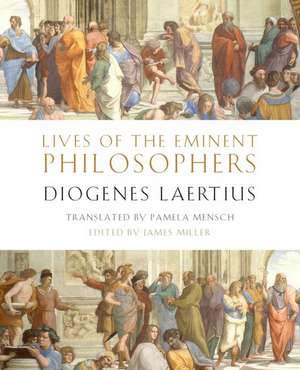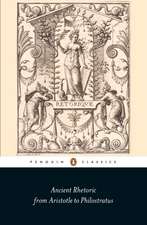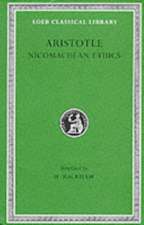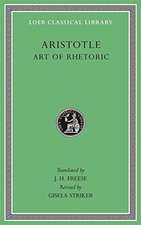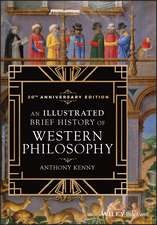Lives of the Eminent Philosophers: by Diogenes Laertius
Traducere de Pamela Mensch Editat de James Milleren Limba Engleză Hardback – 14 iun 2018
Preț: 346.54 lei
Nou
Puncte Express: 520
Preț estimativ în valută:
66.31€ • 69.23$ • 54.88£
66.31€ • 69.23$ • 54.88£
Carte disponibilă
Livrare economică 03-10 martie
Livrare express 28 februarie-06 martie pentru 100.32 lei
Preluare comenzi: 021 569.72.76
Specificații
ISBN-13: 9780190862176
ISBN-10: 0190862173
Pagini: 704
Ilustrații: 100+ illustrations
Dimensiuni: 206 x 231 x 61 mm
Greutate: 1.86 kg
Editura: Oxford University Press
Colecția OUP USA
Locul publicării:New York, United States
ISBN-10: 0190862173
Pagini: 704
Ilustrații: 100+ illustrations
Dimensiuni: 206 x 231 x 61 mm
Greutate: 1.86 kg
Editura: Oxford University Press
Colecția OUP USA
Locul publicării:New York, United States
Recenzii
Now, readers can consult the Lives in a beautiful English translation by Pamela Mensch. This translation will undoubtedly supersede that by Robert Hicks, published in 1925 and until now the standard English version. [...] Oxford University Press have also done a wonderful job. The footnotes... are well judged, providing important background information without overwhelming the text. Embellishment is provided in the form of many philosophically inspired artworks, all handsomely reproduced [...] A set of essays by leading scholars such as Anthony Grafton, Ingrid Rowland and Dorandi himself help introduce the Lives and its reception to general readers. The book is like no history of philosophy that such readers will be used to.
Can there be a philosophy book for everyone? Luxurious yet affordable, this richly illustrated translation of Diogenes Laertius clearly implies an affirmative answer. Obviously, the success of this volume does not follow from the irresistible charm of Diogenes'text (to put it mildly), but from a multifaceted editorial effort that made the resulting artefact appealing to different kinds of readers.
A handsome new volume of Diogenes Laertius's Lives of the Eminent Philosophers provides an opportunity to revisit the biographer and the popular assumptions about him. I am delighted to have acquired Pamela Mensch's new translation of his major work, an edition you can't read on the subway but whose large dimensions are redeemed by the readable translation, glossy color images, and a collection of new accompanying essays (The New School's James Miller is the editor) ... Biographies can certainly get far more scandalous than Lives, but the personal lives of our intellectual ancestors are always juicy, forbidden fruits.
The English translation by Pamela Mensch is lively, fresh, engaging, and eminently readable. Given the number of vagaries, jokes, technicalities, and such that proliferate in the Greek, this is a most impressive achievement. The copious notes, helpfully placed beneath the translation on each page, are superb at giving required information on names, dates, places, technical terms, and so forth in a crisp and accurate manner... This book offers a wealth of material on Diogenes Laertius: a translation, notes, a companion, a bibliography, all in one volume. It is a truly first-class resource, and everyone involved, including Oxford University Press, should be heartily congratulated for a brilliant achievement. That a book of this kind can be made affordable should be a salutary lesson for other academic publishers. I cannot recommend it highly enough.
This book will be useful to all students studying Greek philosophy, as both a reference to the past and a look into the birth of Greek philosophy ... Recommended.
Diogenes Laertius presented afresh with all the generosity, visual richness, and breadth of reference he deservesa wonderful edition.
In this superbly produced and edited volume, the compendious work of the learned Diogenes Laertius at last receives the prominence that his unique contribution to our knowledge and understanding of ancient philosophy requires. The admirable translation by doyenne Pamela Mensch is accompanied by a full apparatus of the latest scholarship, including essays by over a dozen of the most eminent philosophers and historians of philosophy of our own day.
Diogenes Laertius is not Nietzsches dim-witted watchman of the history of Greek philosophy, but a fascinating and underrated figure. This is a wonderful edition, brilliantly translated, with a helpful introduction and accompanying set of essays by first-rate scholars. Although a precious source for many ancient philosophers, especially Epicurus, Diogenes Laertius is much more than a dull compiler. For anyone interested in the relations between philosophy and life, this book remains an excellent, accessible, and hugely entertaining starting point. Highly recommended.
Diogenes Laertius' Lives provides a uniquely valuable and entertaining window on early Western philosophyif it is used wisely. This welcome edition and translation by Pamela Mensch and James Miller, together with its substantial accompanying essays, enables contemporary readers to make the most of it.
This splendid new translation of Diogenes Laertius' Lives is an indispensable resource for anyone interested in the therapeutic legacy of ancient Greek philosophy. Quirky, notoriously unreliable, relentlessly curious, it is also magnificent bedside reading, still able after many centuries to instruct and delight.
At last, thanks to Pamela Mensch's elegant and faithful translation, we can enjoy Diogenes Laertius' history of Greek philosophy for its own sake, as a wonderful compendium of doctrine and lore, as well as for the precious information (and sometimes misinformation) it provides about everything from the Pre-Socratics to Plato, Aristotle, the Stoics, and Epicurus. The notes are crisp and clear, illustrations are apt and abundant, and the translation is based on the most authoritative edition of the Greek text. It is a wonderful achievement.
Can there be a philosophy book for everyone? Luxurious yet affordable, this richly illustrated translation of Diogenes Laertius clearly implies an affirmative answer. Obviously, the success of this volume does not follow from the irresistible charm of Diogenes'text (to put it mildly), but from a multifaceted editorial effort that made the resulting artefact appealing to different kinds of readers.
A handsome new volume of Diogenes Laertius's Lives of the Eminent Philosophers provides an opportunity to revisit the biographer and the popular assumptions about him. I am delighted to have acquired Pamela Mensch's new translation of his major work, an edition you can't read on the subway but whose large dimensions are redeemed by the readable translation, glossy color images, and a collection of new accompanying essays (The New School's James Miller is the editor) ... Biographies can certainly get far more scandalous than Lives, but the personal lives of our intellectual ancestors are always juicy, forbidden fruits.
The English translation by Pamela Mensch is lively, fresh, engaging, and eminently readable. Given the number of vagaries, jokes, technicalities, and such that proliferate in the Greek, this is a most impressive achievement. The copious notes, helpfully placed beneath the translation on each page, are superb at giving required information on names, dates, places, technical terms, and so forth in a crisp and accurate manner... This book offers a wealth of material on Diogenes Laertius: a translation, notes, a companion, a bibliography, all in one volume. It is a truly first-class resource, and everyone involved, including Oxford University Press, should be heartily congratulated for a brilliant achievement. That a book of this kind can be made affordable should be a salutary lesson for other academic publishers. I cannot recommend it highly enough.
This book will be useful to all students studying Greek philosophy, as both a reference to the past and a look into the birth of Greek philosophy ... Recommended.
Diogenes Laertius presented afresh with all the generosity, visual richness, and breadth of reference he deservesa wonderful edition.
In this superbly produced and edited volume, the compendious work of the learned Diogenes Laertius at last receives the prominence that his unique contribution to our knowledge and understanding of ancient philosophy requires. The admirable translation by doyenne Pamela Mensch is accompanied by a full apparatus of the latest scholarship, including essays by over a dozen of the most eminent philosophers and historians of philosophy of our own day.
Diogenes Laertius is not Nietzsches dim-witted watchman of the history of Greek philosophy, but a fascinating and underrated figure. This is a wonderful edition, brilliantly translated, with a helpful introduction and accompanying set of essays by first-rate scholars. Although a precious source for many ancient philosophers, especially Epicurus, Diogenes Laertius is much more than a dull compiler. For anyone interested in the relations between philosophy and life, this book remains an excellent, accessible, and hugely entertaining starting point. Highly recommended.
Diogenes Laertius' Lives provides a uniquely valuable and entertaining window on early Western philosophyif it is used wisely. This welcome edition and translation by Pamela Mensch and James Miller, together with its substantial accompanying essays, enables contemporary readers to make the most of it.
This splendid new translation of Diogenes Laertius' Lives is an indispensable resource for anyone interested in the therapeutic legacy of ancient Greek philosophy. Quirky, notoriously unreliable, relentlessly curious, it is also magnificent bedside reading, still able after many centuries to instruct and delight.
At last, thanks to Pamela Mensch's elegant and faithful translation, we can enjoy Diogenes Laertius' history of Greek philosophy for its own sake, as a wonderful compendium of doctrine and lore, as well as for the precious information (and sometimes misinformation) it provides about everything from the Pre-Socratics to Plato, Aristotle, the Stoics, and Epicurus. The notes are crisp and clear, illustrations are apt and abundant, and the translation is based on the most authoritative edition of the Greek text. It is a wonderful achievement.
Notă biografică
Pamela Mensch is a translator of Greek prose whose works include The Landmark Arrian: The Campaigns of Alexander (Anchor, 2012), Herodotus' Histories (Hackett, 2014, ed. James Romm), and Plutarch's The Age of Caesar: Five Roman Lives (Norton, 2017, ed. Romm).James Miller is Professor of Liberal Studies and Politics and Faculty Director of Creative Publishing & Critical Journalism at the New School. He has authored and edited an array of reputed works, including Examined Lives: From Socrates to Nietzsche (Picador, 2012), The Passion of Michel Foucault (Simon & Schuster, 1993), History and Human Existence: From Marx to Merleau-Ponty (University of Chicago Press, 1982), and the Rolling Stone Illustrated History of Rock'n'Roll (Random House, 1976), among numerous others.
